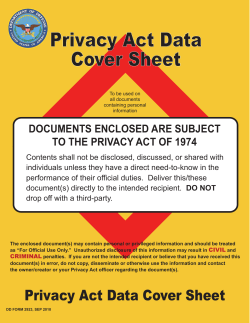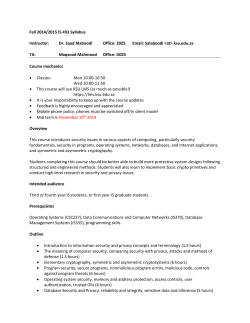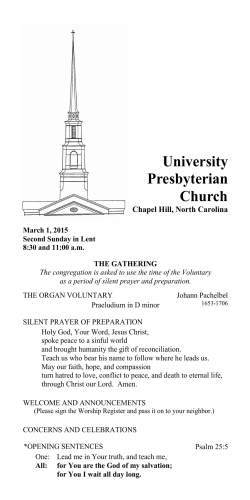
Vita - Anthony Vance
Curriculum Vitae Anthony Vance Associate Professor Information Systems Department Marriott School of Management Brigham Young University Anthony@Vance.name http://anthonyvance.com +1 801 361 2531 BYU Neurosecurity Lab http://neurosecurity.byu.edu Updated April 27, 2015 RESEARCH INTERESTS 1. Behavioral information security 2. Neuroscience applications to information security EDUCATION Ph.D., Information Processing Science University of Oulu, Oulu, Finland 2010 Dissertation: “Why Do Employees Violate IS Security Policies? Insights from Multiple Theoretical Perspectives” Ph.D., Computer Information Systems Georgia State University, Atlanta, Georgia, USA 2009 Joint-dissertation: “Trusting IT Artifacts: How Trust Affects our Use of Technology” Ph.D., Management Science Université Paris–Dauphine, Paris, France Research Center in Management and Organization (DRM/CREPA) 2008 Joint-dissertation: “Trusting IT Artifacts: How Trust Affects our Use of Technology” Master of Information Systems Management, Marriott School Brigham Young University, Provo, Utah, USA 2004 Bachelor of Science, Information Systems, Marriott School Brigham Young University, Provo, Utah, USA 2003 WORK EXPERIENCE Assistant Professor Brigham Young University, Utah, USA 2009–Present Visiting Research Professor University of Oulu, Oulu, Finland 2008–2010 Instructor Georgia State University, Atlanta, Georgia 2006–2008 Fraud Investigator Data Quality Integrity, Deloitte LLP, Atlanta, Georgia 2005 Information Security Auditor Enterprise Risk Services, Deloitte LLP, Atlanta, Georgia 2004 SCHOLARSHIP METRICS • • 1051 citations per Google Scholar 12 H-index REFEREED JOURNAL PUBLICATIONS 19. Vance, A., Lowry, P.B., Eggett, D. 2015. “Increasing Accountability through User-Interface Design Artifacts: A New Approach to Addressing the Problem of Access-Policy Violations,” MIS Quarterly, 39 (2), pp. 345–366. 18. Vance, A., Anderson, B., Kirwan, B., Eargle, D. 2014. “Using Measures of Risk Perception to Predict Information Security Behavior: Insights from Electroencephalography (EEG),” Journal of the Association for Information Systems, 15 (10), pp. 679–722. 17. Siponen, M., Vance, A. 2014. “Guidelines for Improving the Contextual Relevance of Field Surveys: The Case of Information Security Policy Violations,” European Journal of Information Systems, 23 (3), pp. 289– 305. 16. Lowry, P.B., Moody, G., Galletta, D., Vance, A. 2013. “The Drivers in the Use of Online Whistle-Blowing Reporting Systems,” Journal of Management Information Systems, 30 (1), pp. 153–190. 15. Vance, A., Lowry, P.B., Eggett, D. 2013. “Using Accountability to Reduce Access Policy Violations in Information Systems,” Journal of Management Information Systems, 29 (4), pp. 263–289. 14. Abbasi, A., Albrecht, C., Vance, A., Hansen, J. 2012. “MetaFraud: A MetaLearning Framework for Detecting Financial Fraud,” MIS Quarterly, 36 (4), pp. 1293–1327. 13. Siponen, M., Vance, A., Willison, R. 2012. “New Insights into the Problem of Software Piracy: The Effects of Neutralization, Shame, and Moral Beliefs,” Information & Management, 49 (7-8), pp. 334–341. 12. Mahmood, M., Siponen, M., López, F., Vance, A. 2012. “Measuring Electronic Commerce Technology Enabled Business Value: An Empirical Investigation,” Journal of Organizational Computing and Electronic Commerce, 22 (3), pp. 256–279. 11. Vance, A., Siponen, M., Pahnila, S. 2012. “Motivating IS Security Compliance: Insights from Habit and Protection Motivation Theory,” Information & Management, 49, pp. 190–198. 10. Lowry, P.B., Moody, G., Vance, A., Jensen, M., Jenkins, J., and Wells, T. 2012. “Using an Elaboration Likelihood Approach to Better Understand the Persuasiveness of Website Privacy Assurance Cues for Online Consumers,” Journal of the American Society for Information Science and Technology, 63 (4), pp. 755–776. 9. Borthick, F., Schneider, G., Vance, A. 2012. “Using Graphical Representations of Business Processes in Evaluating Internal Control,” Issues in Accounting Education, 27 (1), pp. 123–140. 8. Vance, A., Siponen, M. 2012. “IS Security Policy Violations: A Rational Choice Perspective,” Journal of Organizational and End User Computing, 24 (1), pp. 21–41. 7. Barlow, J., Giboney, J., Keith, M., Wilson, D., Schuetzler, R., Lowry, P.B., Vance, A. 2011. “Overview and Guidance on Agile Development in Large Organizations,” Communications of the AIS, 29 (2), pp. 25–44. 6. Siponen, M., Vance, A. 2010. “Neutralization: New Insights into the Problem of Employee Information Systems Security Policy Violations,” MIS Quarterly, 34 (3), pp. 487–502. 5. Borthick, A. F., Schneider, G., Vance, A. 2010. “Preparing Graphical Representations of Business Processes and Making Inferences from Them,” Issues in Accounting Education, 25 (3), pp. 569–582. 4. Vance, A., Lowry, P.B., Ogden, J. 2010. “Testing the Potential of RFID to Increase Supply-Chain Agility and to Mitigate the Bullwhip Effect,” International Journal of Applied Logistics, 1 (1), pp. 48–56. 3. Myyry, L., Siponen, M., Pahnila, S., Vartiainen, T., and Vance, A. 2009. “What Levels of Moral Reasoning and Values Explain Adherence to Information Security Rules? An Empirical Study,” European Journal of Information Systems, 18, pp. 126–139. 2. Vance, A., Elie-dit-Cosaque, C., and Straub, D. 2008. “Examining Trust in Information Technology Artifacts: The Effects of System Quality and Culture,” Journal of Management Information Systems, 24 (4), pp. 73– 100. 1. Lowry, P.B., Vance, A., Moody, G., Beckman, B., Read, A. 2008. “Explaining and Predicting the Impact of Branding Alliances and Web Site Quality on Initial Consumer Trust of E-Commerce Web Sites,” Journal of Management Information Systems, 24 (4), pp. 201–227. CONFERENCE PUBLICATIONS 23. Lerner, A. Saxena, A., Ouimet, K., Turley, B., Vance, A., Kohno, Y., Roesner, F. 2015. “Analyzing the Use of Quick Response Codes in the Wild,” Proceedings of the Thirteenth International Conference on Mobile Systems, Applications and Services, (MobiSys), Florence, Italy. 13% acceptance rate. 22. Anderson, B., Kirwan, B., Eargle, D., Howard, S, Vance, A. 2015. “How Polymorphic Warnings Reduce Habituation in the Brain—Insights from an fMRI Study,” Proceedings of the ACM Conference on Human Factors in Computing Systems (CHI), Seoul, Korea. 24% acceptance rate. 21. Anderson, B., Vance, A., Kirwan, B., Eargle, D., Howard, S. 2014. “Users Aren’t (Necessarily) Lazy: Using NeuroIS to Explain Habituation to Security Warnings,” International Conference on Information Systems, Auckland, New Zealand. 20. Anderson, B., Vance, A., Kirwan, B., Eargle, D., Howard, S. 2014. “Why Users Habituate to Security Warnings: Insights from fMRI,” The Dewald Roode Workshop on Information Systems Security Research, IFIP WG8.11/WG11.13, Newcastle, UK. 19. Eargle, D., Vance, A., Eggett, D., Lowry, P.B. 2013. “How Moral Intensity and Impulsivity Moderate the Influence of Accountability on Access Policy Violations in Information Systems,” Workshop on Information Security & Privacy, AIS SIGSEC and IFIP TC11.1, Milan, Italy. 18. Anderson, B., Vance, A., Eargle, D. 2013. “Is Your Susceptibility to Phishing Dependent on Your Memory?,” Workshop on Information Security & Privacy, AIS SIGSEC and IFIP TC11.1, Milan, Italy. 17. Anderson, B., Vance, A., Eargle, D., Brock, K. 2013. “Your Memory is Working Against You: How Eye Tracking and Memory Explain Susceptibility to Phishing,” The Dewald Roode Workshop on Information Systems Security Research, IFIP WG8.11/WG11.13, Niagara, NY. 16. Vance, A., Anderson, B., Brock, K., Eargle, D. 2013. “Using Measures of Risk Perception to Predict Information Security Behavior: Insights from Electroencephalography (EEG),” JAIS workshop, Gmunden Retreat on NeuroIS, Gmunden, Austria. 15. Vance, A., Eargle, D., Ouimet, K., Straub, D. 2013. “Enhancing Password Security through Interactive Fear Appeals: A Web-based Field Experiment,” Hawaii International Conference on Systems Sciences, Wailea, HI. 14. Eargle, D., Vance, A., Allen, G., Barrick, D., Peck, D., Bearnson, T., Tian, J. 2012. “Justifying Breaking the Glass: How Accountability Can Deter Unauthorized Access,” Workshop on Information Security & Privacy, AIS SIGSEC and IFIP TC11.1, Orlando, FL. 13. Anderson, B., Vance, A., Hansen, J., Kirwan, B., Eargle, D., Hinkle, L., Weagel, A. 2012. “Neural Correlates of Gender Differences in Distinguishing Malware Warnings and Legitimate Websites: A NeuroIS Study,” The Dewald Roode Workshop on Information Systems Security Research, IFIP WG8.11/WG11.13, Provo, UT. 12. Vance, A., Eargle, D., Ouimet, K., Straub, D. 2012. “How Interactivity Can Enhance the Effectiveness of Fear Appeals: A Web-based Field Experiment of Password Security,” The Dewald Roode Workshop on Information Systems Security Research, IFIP WG8.11/WG11.13, Provo, UT. 11. Vance, A., Molyneux, B., Lowry, P.B. 2012. “Reducing Unauthorized Access by Insiders through End-User Design: Making Users Accountable,” Hawaii International Conference on Systems Sciences, Wailea, HI. 10. Vance, A., Siponen, M., Warkentin, M. 2011. “Deterrence Without Borders: How National Culture Affects IS Security Policy Violations,” Workshop on Information Security & Privacy, AIS SIGSEC and IFIP TC11.1, Shanghai. 9. Vance, A., Molyneux, B., Lowry, P.B. 2011. “A New Approach to the Problem of Unauthorized Access: Raising Perceptions of Accountability through User Interface Design Features,” The Dewald Roode Workshop on Information Systems Security Research, IFIP WG8.11/WG11.13, Blacksburg, VA. 8. Vance, A., Allen, G., Molyneux, B., Lowry, P.B. 2010. “Making Systems Users Accountable: Using Accountability to Reduce Unauthorized Access of Information,” The Dewald Roode Workshop on Information Systems Security Research, IFIP WG8.11/WG11.13, Waltham, MA. 7. Siponen, M., Vance, A., and Willison, R. 2010. “New Insights for an Old Problem: Explaining Software Piracy through Neutralization Theory,” Hawaii International Conference on Systems Sciences, Poipu, HI. 6. Vance, A., Siponen, M., Pahnila, S. 2009. “How Personality and Habit Affect Protection Motivation,” Workshop on Information Systems & Privacy, Phoenix, AZ. 5. Borthick, A. F., Schneider, G. P., and Vance, A. 2009. “Using Graphical Representations of Business Processes in Evaluating Internal Control,” American Accounting Association Annual Midyear Meeting. 4. Borthick, F., Vance, A. 2007. “Preparing Graphical Representations of Business Processes and Making Inferences from Them,” American Accounting Association Annual Meeting. 3. Vance, A. 2007. “Modeling Sarbanes-Oxley Compliance as a Knowledgeintensive Process,” 40th Annual Hawai'i International Conference on System Sciences. 2. Pallud, J., Monod, E., Vance, A. 2006. “The Implications of the Linguistic Turn on IS,” Proceedings of the Twelfth Americas Conference on Information Systems. 1. Vance, A. 2005. “An Empirical Test of the Potential of RFID Technology to Enhance Supply Chain Agility,” IFIP WG 8.6 Working Conference on Business Agility and IT Diffusion. UNIVERSITY SERVICE • • • • • • • Information Security and Privacy Committee member, university level, 2014–present. Faculty advisor, BYU Student Security Team, university level, 2013– present. Alumni Relations Committee Chair, department level, 2014–present. Information Security & Digital Forensics track director, Masters of Information Systems Management program, department level, 2012– present. PhD Preparation track director, Masters of Information Systems Management program, department level, 2011–present. Faculty recruiting committee member, department level, 2010–present. Marriott School Marketing and Behavioral Lab Steering Committee member, college level, 2010–present. STUDENT MENTORING AND GRANTS • • • • • • • • • • 2015 Google Faculty Research Award for proposal entitled, “Has Your Warning Turned into Wallpaper? Using Neuroscience to Design Habituation-Resistant Security Messages.” Awarded $35,503 with Drs. Bonnie Anderson and Brock Kirwan. 2015 Extension of Magnetic Resonance Imaging Research Facility Initiation Grant, “Understanding the Efficacy of Video-Based Software Privacy Policies.” Awarded $5,000 with Drs. Mark Keith and Bonnie Anderson. 2014 NSF Secure & Trustworthy Cyberspace for proposal entitled, “The Force of Habit: Using fMRI to Explain Users’ Habituation to Security Warnings.” Awarded $294,341 with Drs. Bonnie Anderson and Brock Kirwan. 2014 Mentoring Environment Grant for proposal entitled “Your Memory is Working Against You: Using fMRI to Explain How Memory Affects Susceptibility to Phishing.” Awarded $19,527 to fund mentored research with MISM graduate students. 2014 Magnetic Resonance Imaging Research Facility Initiation Grant, “Understanding the Efficacy of Video-Based Software Privacy Policies.” Awarded $5,000 with Drs. Mark Keith and Bonnie Anderson. 2014 ORCA grant for proposal entitled “Look Sharp! How Eye Tracking and Memory Explain Susceptibility to Phishing.” Mentored BSIS students Ian Jones, Thomas Kelly, and Jeff Penovich for a $1,500 grant. 2012 Mentoring Environment Grant for proposal entitled “Accountability through Justification: A New Approach to the Problem of Unauthorized Access of Information Systems.” Awarded $19,704 to fund mentored research with MISM graduate students. 2012 Global Management Center Grant for International Business Research, for “Deterrence without Borders: How National Culture Affects Information Security Policy Violations.” Awarded $1,000. 2011 ORCA grant for proposal entitled “Making Systems Users Accountable through User Interface Design Features.” Mentored BSIS student Lee Wood for his $1,500 grant. 2011 ORCA grant for proposal entitled “Enhancing Password Security through Interactive Fear Appeals.” Mentored BSIS student Kirk Ouimet for his $1,500 grant. EXTERNAL SERVICE • AE for Decision Sciences Journal, 2015—present. • AE for European Journal of Information Systems, special issue on “Security and Privacy in 21st Century Organisations.” • Editor, IFIP Working Group 8.11/11.13, “Information Systems Security Research.” • Minitrack chair, “Innovative Behavioral IS Security and Privacy Research,” HICSS. • Program Committee member of the Gmunden Retreat on NeuroIS 2015, Gmuden, Austria. • AE for ICIS 2015, “Security and Privacy of Information and IS,” Ft. Worth, TX. • AE for ECIS 2015, “IS Privacy and Security” track, Münster, Germany. • AE for ICIS 2014, “IS Security and Privacy” track, Auckland, New Zealand. • AE for ECIS 2014, “Information Security and Privacy” track, Tel-Aviv, Israel. • Session chair for ICIS 2013, “Security and Privacy” track, Milan, Italy. • AE for ICIS 2013, “Security and Privacy” track, Milan, Italy. • Program committee member, Workshop on Information Security & Privacy (WISP), AIS SIGSEC and IFIP TC11.1, Milan, Italy, 2013. • AE for PACIS 2013, Information Security, Jeju, Korea. • Dissertation committee member for Sumantra Sarkar, Georgia State University. • Dissertation opponent for Ella Kolkowska, Örebro University, 2013. • General chair, Dewald Roode Workshop on Information Systems Security Research, IFIP Working Group 8.11/11.13, 2012, Provo, UT. • AE for ICIS 2012, “Security and Privacy” track, Orlando, Florida. • AE for ECIS 2012, “Information Security and Privacy” track, Barcelona, Spain. • Member of 2012 NSF review panel for Secure and Trustworthy Computing grant applications, Arlington, Virginia. • Program committee member, European Security Conference, 2012, Örebro, Sweden. • AE for ICIS 2011, “Security and Privacy” track, Shanghai, China. • Track chair for ECIS 2011, “Information Security and Privacy” track, Helsinki, Finland. • Program committee member, Privacy Enhanced Technology and Security Engineering 2011, Busan, Korea. • Program chair, Dewald Roode Workshop on Information Systems Security Research, IFIP Working Group 8.11/11.13, 2010, Waltham, MA. • Proceedings editor, Dewald Roode Workshop on Information Systems Security Research, IFIP Working Group 8.11/11.13, 2009, Cape Town, South Africa. • Ad hoc reviewer for MISQ, ISR, JAIS, JMIS, EJIS, ISJ, CACM, I&O, IJEC, CAIS, JISSEC, JOEUC, SGR. SPECIAL RECOGNITIONS/AWARDS • Selvoy J. Boyer Fellowship, Marriott School of Management, 2012—present. • Outstanding Research, 2014 Marriott School of Management. • Nominated for best paper, “Reducing Unauthorized Access by Insiders through End-User Design: Making Users Accountable,” Vance, A., Molyneux, B., and Lowry, P.B., Hawaii International Conference on Systems Sciences, 2012. • Dissertation awarded grade “excellent” (5/5) by the University of Oulu, Finland, 2010. • Nominated for best paper, “New Insights for an Old Problem: Explaining Software Piracy through Neutralization Theory,” Siponen, M., Vance, A., and Willison, R., Hawaii International Conference on Systems Sciences, 2010. • Best Case Award, Borthick, A. F., Schneider, G. P., and Vance, A. “Using Graphical Representations of Business Processes in Evaluating Internal Control”, American Accounting Association Annual Midyear Meeting, 2010. • Outstanding Education Paper Award, Borthick, A. F., Schneider, G. P., and Vance, A. “Preparing Graphical Representations of Business Processes and Making Inferences from Them”, American Accounting Association Annual Midyear Meeting, 2009. • J. Mack Robinson College of Business GTA Teaching Excellence Award, Georgia State University, 2008. • Nominated for best reviewer, 6th Annual Workshop on HCI in MIS, Montreal, 2007. PROFESSIONAL AFFILIATIONS • Founding member, IFIP Working Group 8.11/11.13, “Information Systems Security Research” • Special Interest Group on Security (SIGSEC), Association for Information Systems FOREIGN LANGUAGE • German
© Copyright 2025










